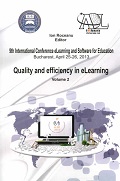LEARNING ARCHITECTURE TO SUPPORT THE DEVELOPMENT OF SOCIO-EMOTIONAL INTELLIGENCE IN A COLLABORATIVE LEARNING ENVIRONMENT THROUGH THE USE OF CONVERSATI
LEARNING ARCHITECTURE TO SUPPORT THE DEVELOPMENT OF SOCIO-EMOTIONAL INTELLIGENCE IN A COLLABORATIVE LEARNING ENVIRONMENT THROUGH THE USE OF CONVERSATI
Author(s): Florentina Hăhăianu, Loredana ManasiaSubject(s): Education
Published by: Carol I National Defence University Publishing House
Keywords: socio-emotional intelligence; collaborative learning environments; conversational agents
Summary/Abstract: Achieving goals in everyday life is also related to emotional intelligence. If traditional education brings us the practice of training of regular intelligence, we assume that digital communities of learning could better focus on socio-emotional intelligence. However, experts in the field of educational sciences postulate an evolution from the century of individual to the century of community. Our approach is to build learning environments where participants can socially interact, build and manage declarative and procedural knowledge, but also develop their competencies in socio-emotional intelligence field by interacting with a Conversational Agent (CA). Learning architectures that propose one-to-one interaction (Learner (L) - Agent Systems) to learn foreign languages solve complex problems or situations have been shown to be effective. Researchers can identify substantial learning gains associated with the involvement of conversational agents. Our work aims to enrich the learning architecture proposed by E. Wenger in social learning theory with the presence and pedagogical roles of a Conversational Agent. In the context of this learning architecture, participants in the learning community become and act as learning agencies. Learner agency is feasible in educational settings, both formal and informal. This paper assumes that the size effect of the immersion of a conversational agent is augmented by the context of a collaborative multi-users digital environment. Additionally, we describe specific roles of the conversational agents derived from the core structure of the socio-emotional intelligence: self-awareness, self regulation, motivation, empathy, and social skills in order to illustrate the desirable properties of this new architecture.
Journal: Conference proceedings of »eLearning and Software for Education« (eLSE)
- Issue Year: 9/2013
- Issue No: 02
- Page Range: 392-397
- Page Count: 6
- Language: English

